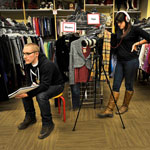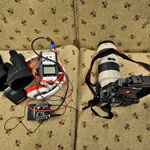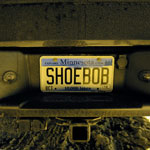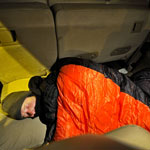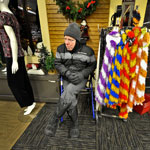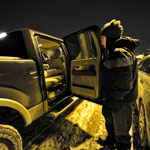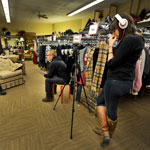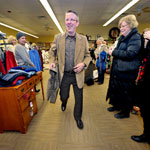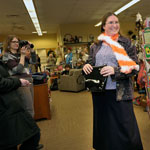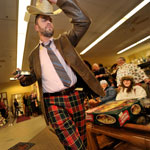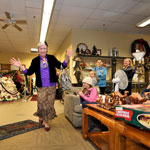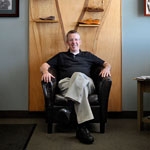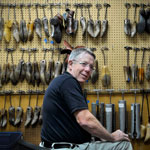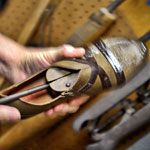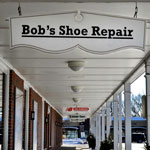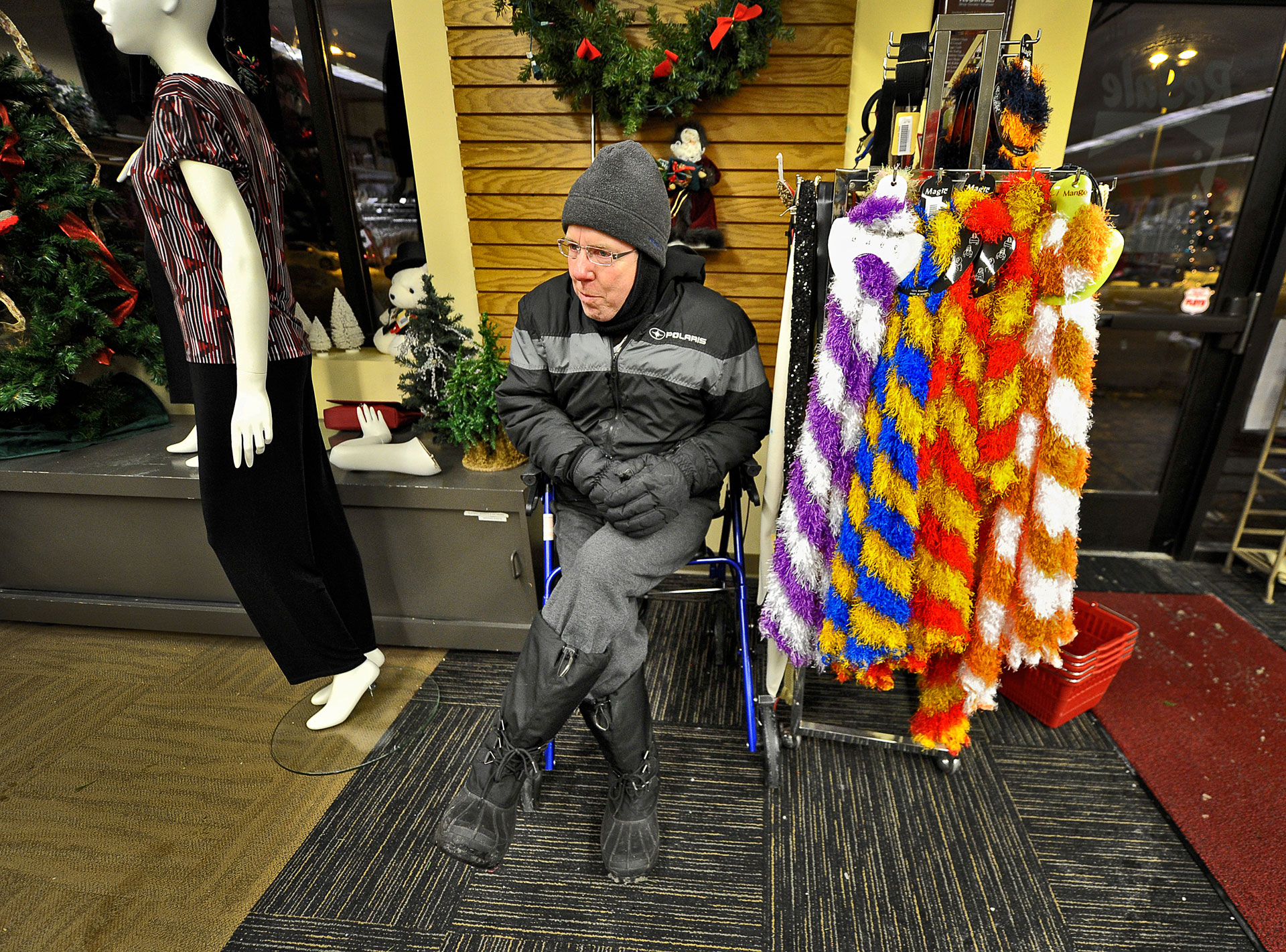
A 'Sleep Out' with Bob Fisher
Shoe repairman. Charitable juggernaut. Motivational speaker. 'Sleep Out' pioneer. The man they call 'Shoe Bob' means many things to the Wayzata community.
The morning after Interfaith Outreach & Community Partner's overnight "Sleep Out" is a testament to resilience. Participants emerge from sleeping bag cocoons with waxy red cheeks and chattering teeth. They escape from automobiles and tents with short, choppy steps. Some look as if they've never been so excited to see 6 a.m.
"I'm so glad that's over," is a reoccurring quote.
So is, "It's not even technically winter yet."
It's the morning of Thursday, Dec. 12, and these cold-weather warriors have just spent the last eight or so hours sleeping in sub-zero temperatures, with wind chills settling around -20 degrees. They're not quite gluttons for punishment, but rather looking to raise awareness for homelessness in the west metro.
In a Ford pick-up truck nestled in a corner of the IOCP parking lot, Bob Fisher sleeps in a semi-awkward position within his crew cab - it's akin to a helix shape. Fisher is perhaps the most prepared "Sleep Out" participant, having cold weather camping gear and years of "Sleep Out" experience under his belt.
In fact, the "Sleep Out" has become relatively commonplace for Fisher, who quietly participates as an equal camper with others despite being the pioneer of IOCP's largest fundraising campaign.
This year's "Sleep Out" targeted a fundraising goal of $2.067 million to help 1,777 families in need. The money helps struggling families with basic needs, such as housing and food, until they can support themselves again.
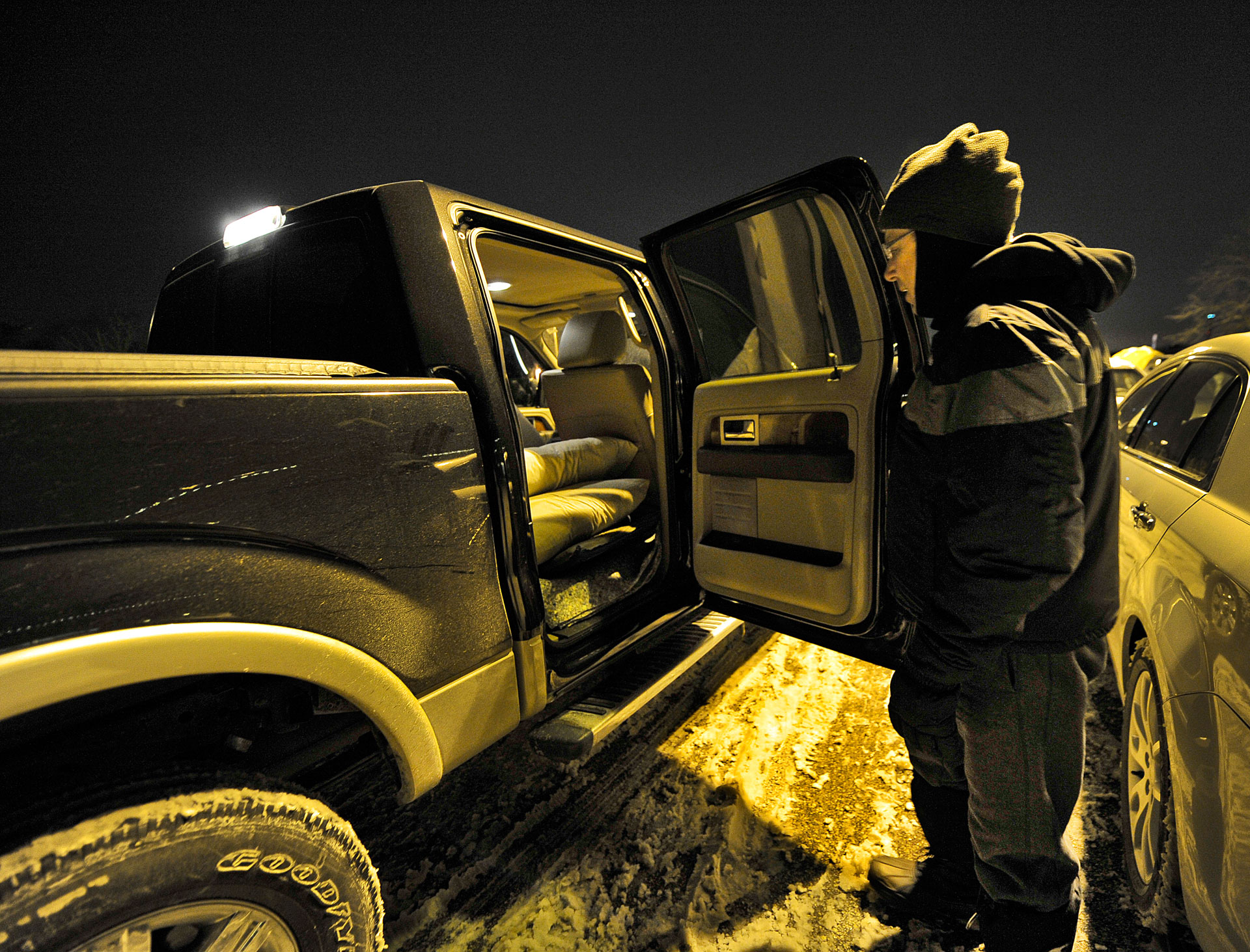
Bob Fisher, who finds his calling
To understand how a sole winter camper helped start a multi-million dollar fundraising and awareness venture, you would need to go back to 1993, and visit Fisher in his back yard.
There, you would find Fisher trying out a new hobby. Fisher was getting stir crazy and needed something to do in the winter. He admitted that he wasn't much of a downhill skier, and was simply not a fan of cross country skiing. He wasn't a strong skater, so hockey was a lost option.
On a trip to a sporting goods store, Fisher was exposed to the world of winter camping. He found a sleeping bag that advertised its ability to withstand temperatures of -15 degrees. With that, Fisher spent his first night out in, of course, subzero temperatures in his back yard. Yet, lying awake shivering gave Fisher a revelation of sorts.
"I went out and set up my tent with no knowledge of winter camping and froze my butt off," Fisher, 65, said. "I learned that I was claustrophobic when I tried to zip the mummy bag all the way. Once I zipped it up I couldn't find the zipper. It was not a good night at all. But at about 2 o'clock in the morning I get this message – I keep thinking of it as a teletype thing going across the front of my brain – and it basically tells me, 'This is a good idea what you're doing. Just move the tent to the front yard and do something for the needy people in Wayzata.'"
Fisher pauses and repeats the phrase, "needy people in Wayzata." Fisher admits that he takes time to let those words sink in when he utters them.
"I joke that maybe there were some people short a BMW payment," Fisher said.
Fisher relocated his tent from his back yard to the front yard to help with community visibility. He said he raised around $10,000 in three weeks when he made the push to do good. With the money, Fisher thought he would purchase Thanksgiving dinners for families that happened to be struggling around the holiday.
Fisher took the money he raised and brought it to IOCP, where he sat down for a discussion with Executive Director LaDonna Hoy, who founded IOCP in 1979.
"I brought the money over to IOCP, and I really thought I'd be putting them out of business because there's not need in Wayzata. If you feed 100 families, that was about it, I figured," Fisher said. "So I brought it over and was feeling a little cocky, I suppose. LaDonna Hoy came and sat down in front of me, looked me right in the eye and made sure I knew what the heck was going on. She said, 'Well, this is really good and you raised a lot of awareness and money. But what good would a hot holiday meal do for a family of four that's living in a car? They have no way to cook it.' I said, 'Living in a car? What do you mean?' And she said, 'Yeah, there's homeless people around here.'"
After his first sleep out, Fisher was not planning on making a tradition of it. By his account, his one year of fundraising was enough for him. But Hoy made a case for him to keep going and to give it a shot the following year. Fisher obliged, but tweaked his mission from providing holiday meals to raising funds and awareness for homelessness and affordable housing issues.
Around the third year of Fisher sleeping out, things started to change. What was once Fisher modestly sleeping in his tent had grown into a small community goal. Tents began popping up on his lawn - people were joining in on the campaign. Area Boy Scout troops made missions of it. Neighbors simply wanted to show support. Former Minnesota Twins third baseman Corey Koskie showed up one year. Even current Twins first baseman Joe Mauer has participated.
"There is no end. The need keeps going on and on," Fisher said. "My only goal was just to raise awareness and to get people involved. So many people are aware and so many people are involved."

Bob Fisher, the man they call 'Shoe Bob'
Bob Fisher is about as famous as a shoe repairman can be. Customers stop into his shop to say hello - no business, simply social niceties. Community members have dubbed him "Shoe Bob," a level of celebrity that he grins and shakes his head at.
Fisher's small shop in the Colonial Square strip mall in Wayzata is just big enough to comfortably move around in. There are shoe instruments that look like props from a Tim Burton film. During a busy time of year, Fisher will see 200 pairs of footwear come through his door in need of repair. He'll fix them all in a timely manner. He's been at the shoe repair business six days a week for 43 years.
A man of deep faith, Fisher has a business slogan that encapsulates his life's work perfectly.
"I don't tell people I'm a shoe repairman. I tell people I 'save soles and heel people.' I think I've saved more 'soles' than Billy Graham has," Fisher quips. "I know I've 'heeled' more people than Billy Graham."
In a culture of career change, Fisher has remained a constant. Shoe repair has a strong lineage in his family, as his grandfather and father both worked as shoe repairmen.
After spending nearly four years in the Navy working in the military postal service, Fisher left without an idea of what he wanted out of his life. Admitting that he wasn't keen on high school, he ruled out college almost immediately - a decision he does not regret.
Fisher started repairing shoes seven days after leaving the military in November of 1970. He worked at a shop in Anoka, making 25 cents an hour with room and board. From that point he was hooked on shoe repair. Being able to have a tangible result of his work gave Fisher the "instant gratification" that he appreciated.
Fisher would then open a small shoe repair shop in Winsted and make a 300-mile trip every week to pick up shoes that needed fixing. He would then make the same trip later in the week to return the shoes.
Pick up. Drop off. Repair. Repeat.
Opportunity knocked in 1972 when The Foursome found themselves in need of someone to pick up their shoe repair orders.
"Their shoe repairman had gotten hurt in an accident and they wound up calling me seeing if I wanted to do their shoes," Fisher recalled. "All of their work was more than I had in all my routes, so I canceled my routes and took their stuff. I did quite well."
Fisher left Winsted without hesitation, leaving all of his old shoe repair equipment behind. He found work and settled down in Wayzata in 1972. It's the place he's called home ever since.
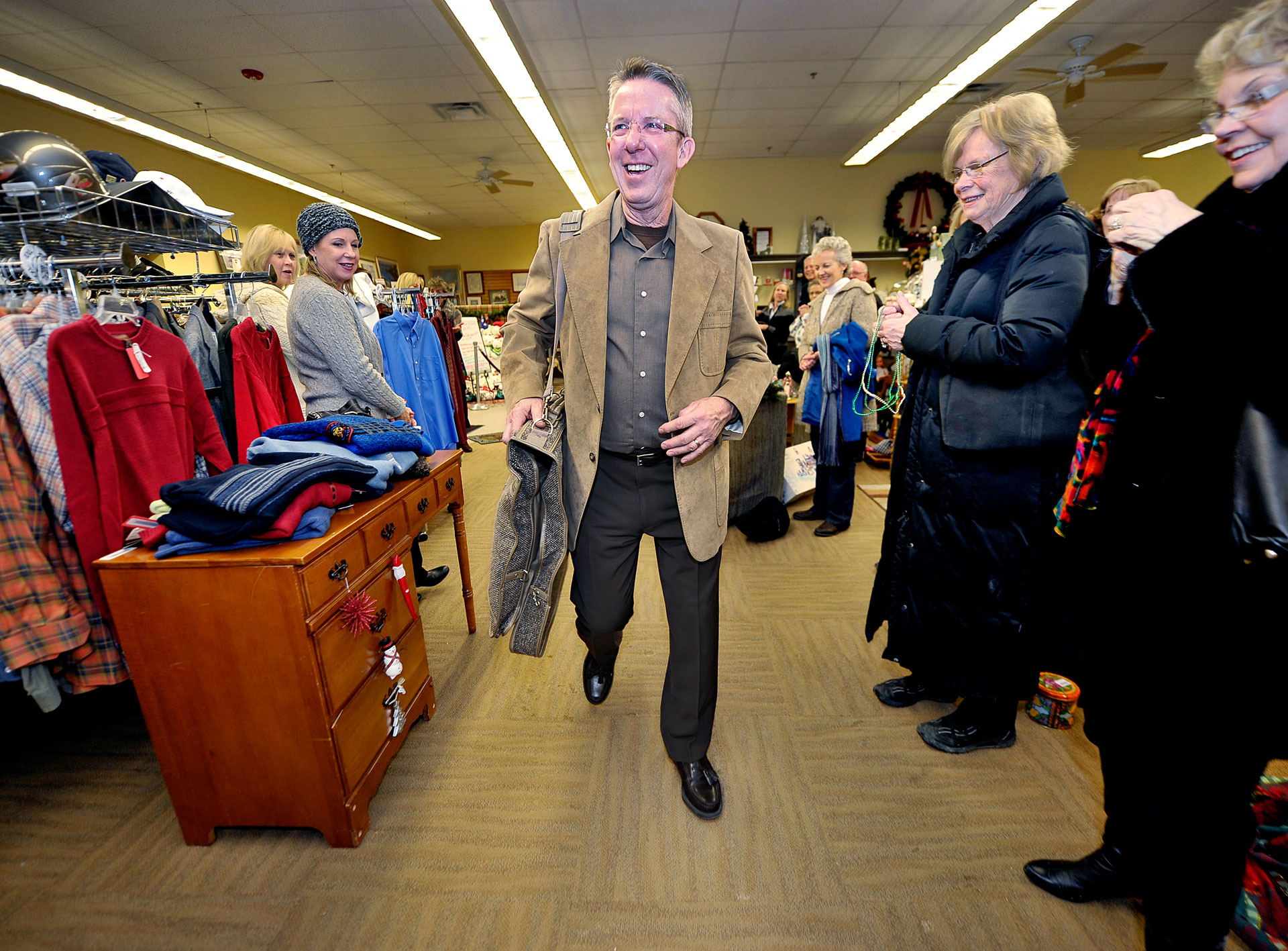
Bob Fisher, who lost himself along the way
This is not a story Fisher likes to tell. Thinking about this particular point in his life is hard enough.
It's the story of how "Shoe Bob" became bigger than life. It may seem unfathomable for some to hear how a shoe repairman can get lost in being a celebrity. But it happened to "Shoe Bob." It happened to Bob Fisher.
On an unusually arctic November morning, Fisher steps away from his business and walks to a nearby bagel shop for breakfast; his short strides somehow cover a swath of ground while squealing serpentine belts cry in the parking lot. He knows everyone at the bagel shop by their first name and a wall of sound consisting of "Hi, Bob" greetings surround him.
This is a good feeling for Fisher. The recognition is nice and the rapport he builds with other community members is important to him.
Fisher sinks into a deep chair. He speaks candidly for some time, then pauses and stares down to collect his thoughts. He doesn't want to dwell on the past, but realizes that it's important to acknowledge. The celebrity of "Shoe Bob" is not a myth, though there have been times when Fisher wishes it was.
"Shoe Bob" is a double-edged sword. On one end, it's a slice of small-town Americana; the kind of nickname that could only emerge in an area where small business is held in high regard. On the other end, it's the kind of learned grandiosity that can create an identity outside of one's self.
Fisher becomes quiet. He remembers the darkest moment in his life, but doesn't feel comfortable indulging in the details.
"I fell for the lie. I allowed myself to become what the community said I was for a while. I think I really believed that anything I did was OK. It didn't make a difference. It wound up costing me my first marriage," Fisher said. "So, I am very cognizant of the feelings I had then. I won't go back there. I will never go back to that feeling. It just strikes fear into my heart. I want to be Bob Fisher. I go by the name 'Shoe Bob' and use the term, but to make me something more than I really am, I don't enjoy it or want it. It has bad connotations for me."
Fisher's second wife, Terrisa, sees Fisher for who he wants to be, his ideal self: A social person who is nothing but cordial and friendly with the people he meets.
"Usually when I'm walking out to the car from dinner or another outing and I get to the door, I'll realize Bob is several people back because he ran into a couple more people he had to say hi to," Terrisa said with a chuckle.
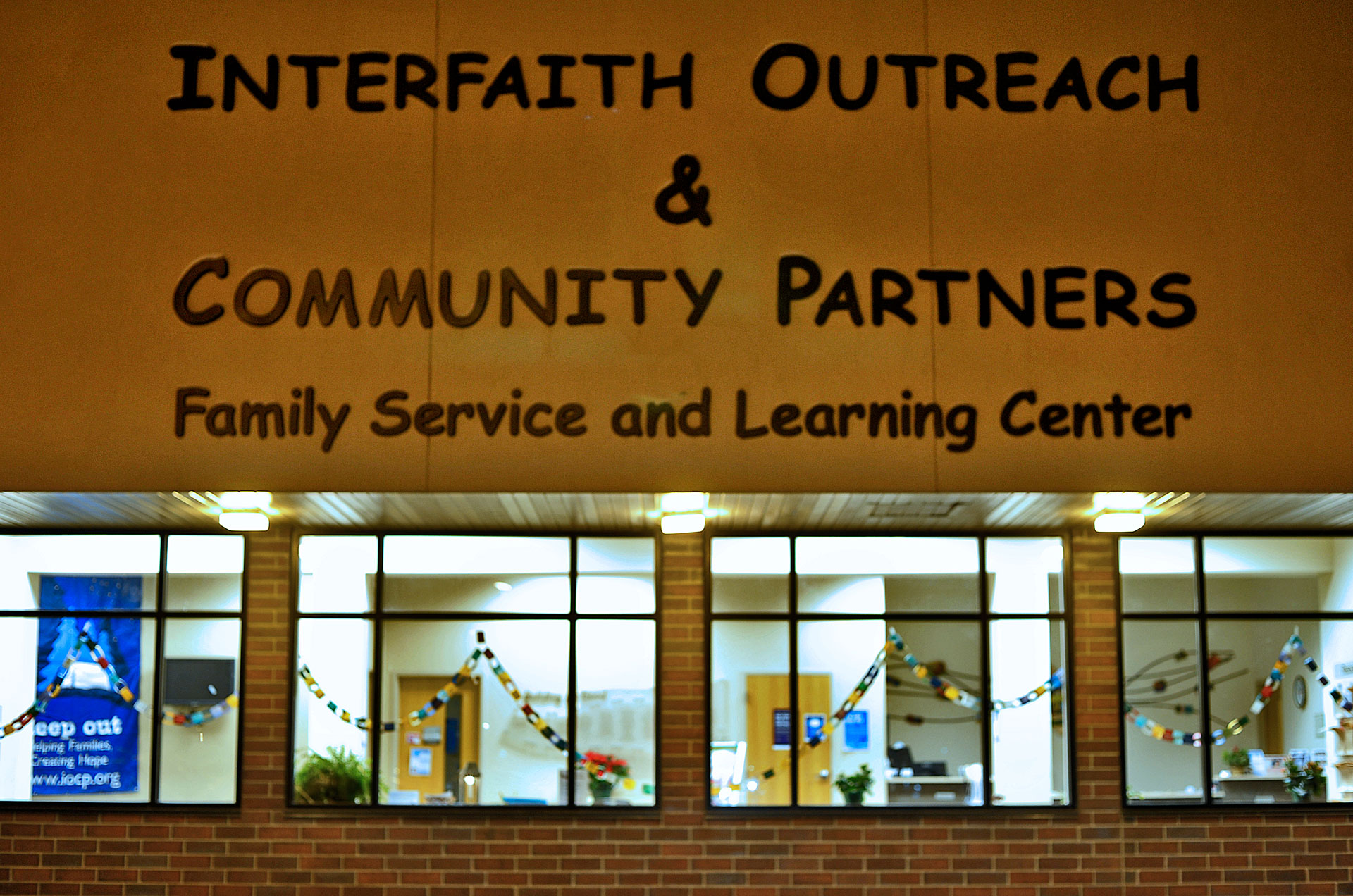
Bob Fisher, a man of faith
Fisher is certain he's here for a reason. For years, he searched for his gifts and strengths to use them for good. Fisher grew up in the Catholic Church and went to mass every day. He's still a regular churchgoer today. He insists he's not the kind of Catholic that will "stand out on the corner and bang people over the head with a bible," but rather a person of faith who is always questioning and seeking answers.
"I always questioned why we had to do things. I just wanted to make it more real," Fisher said. "My faith has always been something I've continually wanted to make real. It's really developed into a deep personal situation."
Fisher's go-to Bible verse is Isaiah 58:10, which he can recite with ease: And if you spend yourselves in behalf of the hungry and satisfy the needs of the oppressed, then your light will rise in the darkness, and your night will become like the noonday.
Yet, faith does not define Fisher. Neither does being a shoe repairman. In fact, Fisher isn't entirely sure what will define his legacy. It's something he actively thinks about. He knows he's been put on Earth for a reason, and he doesn't want to miss the daily callings that he says people receive every day. Fisher doesn't want to lose out on those opportunities.
"I think when I was 35 I had wondered what I had done the first half of my life. The 'sleep out' came a ways after I was 35. I did wonder what I had done, and what I was going to do," Fisher said. "I woke up the morning I turned 36 and I wondered, 'Well, what are people going to say about me when I die?' I figured my wife and kids would be sad for a couple weeks and they'll move on. And then I thought, 'What are my customers gonna do?' I had worked so hard at my shop building my shoe repair business. That's what my whole life had been. That was going to be the answer when I died. People were going to wonder where they were going to get their shoes fixed."
Fisher adjusts himself in his chair. He speaks with confidence, as if he knows that the work he's done with homelessness and affordable housing issues could very well be his life's mission.
"I want to leave a better legacy than (shoe repair). I want to make sure I've left a mark – using the gifts I've been given to help other peoples' lives. I just want to make sure that I make a difference," he said.
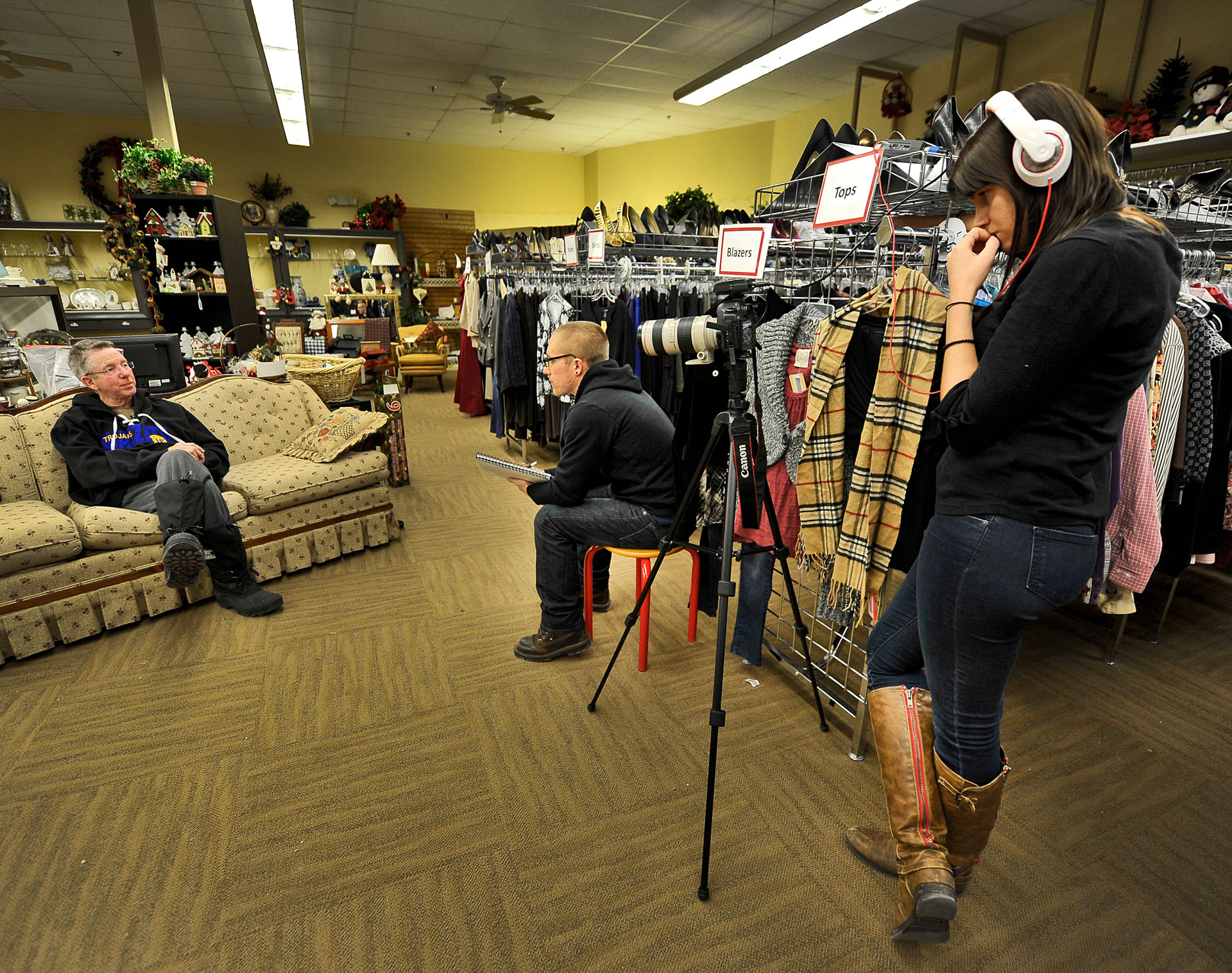
Bob Fisher, the thinker
Q: As a modest and humble person, do you reflect on your life, both past and present, to keep you grounded?
A: "I remember one time I was on an airplane. My wife and I were heading to Florida, and I had a journal I had brought along," Fisher said. "I started writing: 'OK, I'm here right now. This is where I am, flying in the airplane. How did I get here?' Then I backed up a little bit and said, 'OK, how did I get there?' I just kept going backwards. It was a very interesting journey. I think we all look back at our lives and how we get to where we are. I'm a pretty thankful guy. I'm pretty blessed."
Fisher tells this story with relative ease. It's an exercise he remembers fondly and is proud of its undertaking. He pauses after he tells the story and looks off across the bagel shop. He nods and smiles before going back to his breakfast.
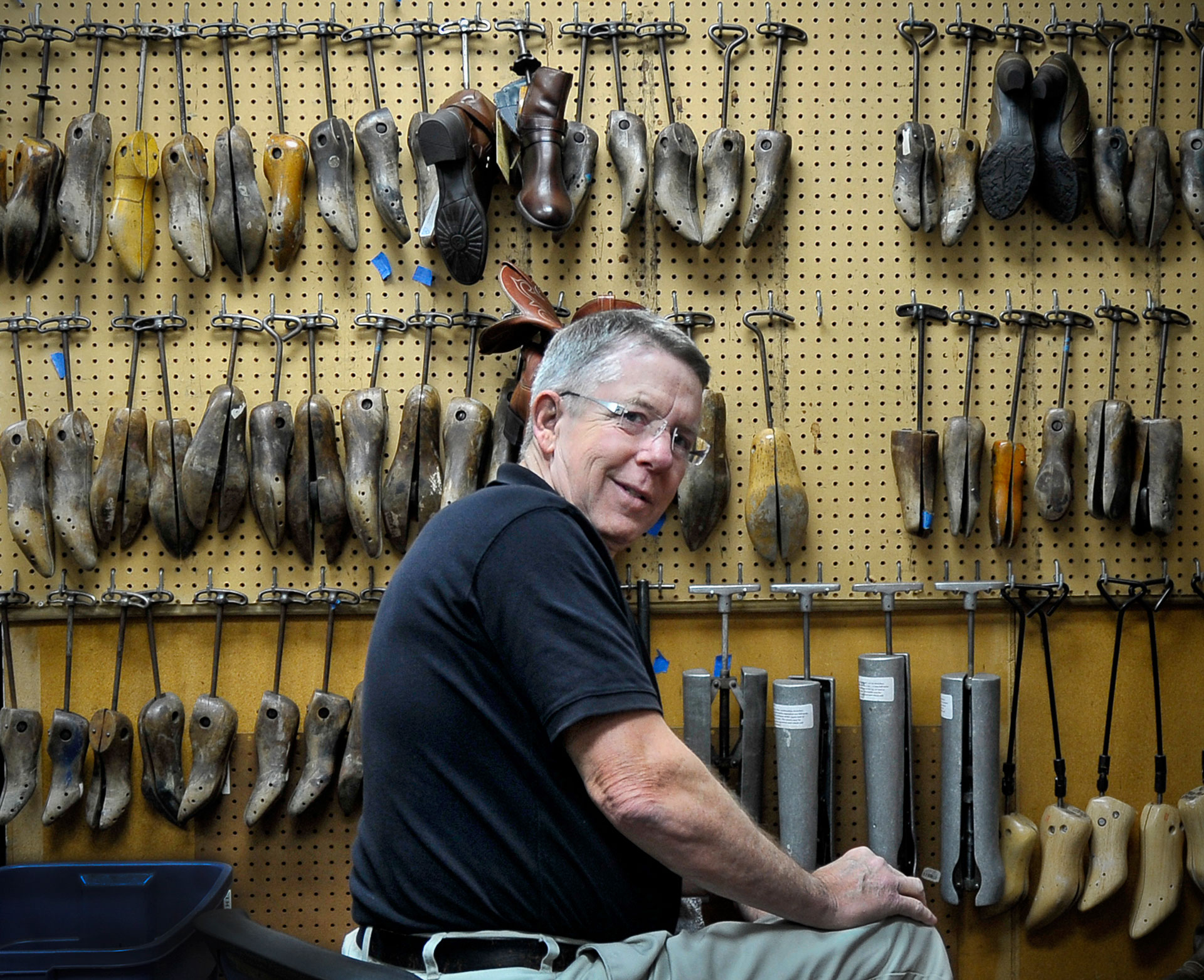
Bob Fisher, a child that experienced struggle
As the second oldest of nine kids, the Fisher family Christmas was a daunting enough task. But there was one year in particular where Fisher learned about being thankful when times get tough.
As a child living in St. Michael, both of Fisher's parents fell on hard times around the holidays. Fisher's father was out of work, and his mother had fallen ill and could not work. There was no cash coming into the house, and the stress of Fisher's parents was lost on him.
"We couldn't even buy a Christmas tree, but none of us kids knew that. So I just had been walking to school and I had kept seeing these scrub jack pines in the ditches," Fisher recalled. "I kept seeing one that I thought would make a really nice Christmas tree. One day I went out and just cut it down. I dragged it home, and it was the ugliest thing. Before my mom died she still talked about it."
Fisher recalled waking up the morning of Christmas Eve and seeing that there had yet to be any presents placed under the tree. As the day wore on, the void under the tree had not yet been resolved. By nightfall, a skeptical Fisher grew more concerned. There would be no presents for the year, an unfortunate result of sullen circumstance.
However, a sudden knock on the door of their family home changed Christmas, and Fisher's outlook on giving back.
"There was this guy from the Knights of Columbus in St. Michael. I answered the door and he said, 'Merry Christmas!' He just started handing these presents inside. He had this great big cigar sticking out of his mouth and was simply handing out Christmas presents. It was one of the best Christmases we ever had," Fisher said.
The impact of the kind gesture resonated throughout the family. In the years to follow, Fisher's father would take any extra income he had around the holidays and purchase meals for families in need. From that point forward, the giving spirit was planted in Fisher.
"We had received something, and we wanted to give something," he said.
Bob Fisher, the difference maker
Fisher can seemingly recall perennial moments in his life effortlessly - moments that shape his world view and define who he is as a person.
Some years ago, Fisher was in Chicago for a seminar. While walking through the downtown heart of the city, he encountered a homeless woman.
"As I went by her, I looked her in the eye and said, 'Hi. How are you doing?' I kept walking – I didn't stop and sit with her or do anything like that," Fisher said. "There were three or four people behind me from my group. They caught up with me and said, 'You should have seen what that did to that woman. She looked up as if she were surprised that someone noticed her or paid attention to her.'"
When finding himself in deep conversation with others, one of Fisher's favorite questions to ask is, "If time and money were not an obstacle, what would you do with your life?"
That question became the foundation of one of Fisher's most memorable exchanges. Fisher recalled a customer that came into his store, who, upon never meeting Fisher, confided in him about his struggles.
"I asked him how he was, and he got this sad look on his face. He said, 'Well, just last week I had to close up my construction business because business was so down and I couldn't afford keeping it open anymore.' I could see his sadness," Fisher remembered. "I asked him that question and he started crying. He said, 'Nobody has ever asked me that question before, and I've never really even thought about it before.' He said he would start a garage band. You could see his happiness when he talked about it."
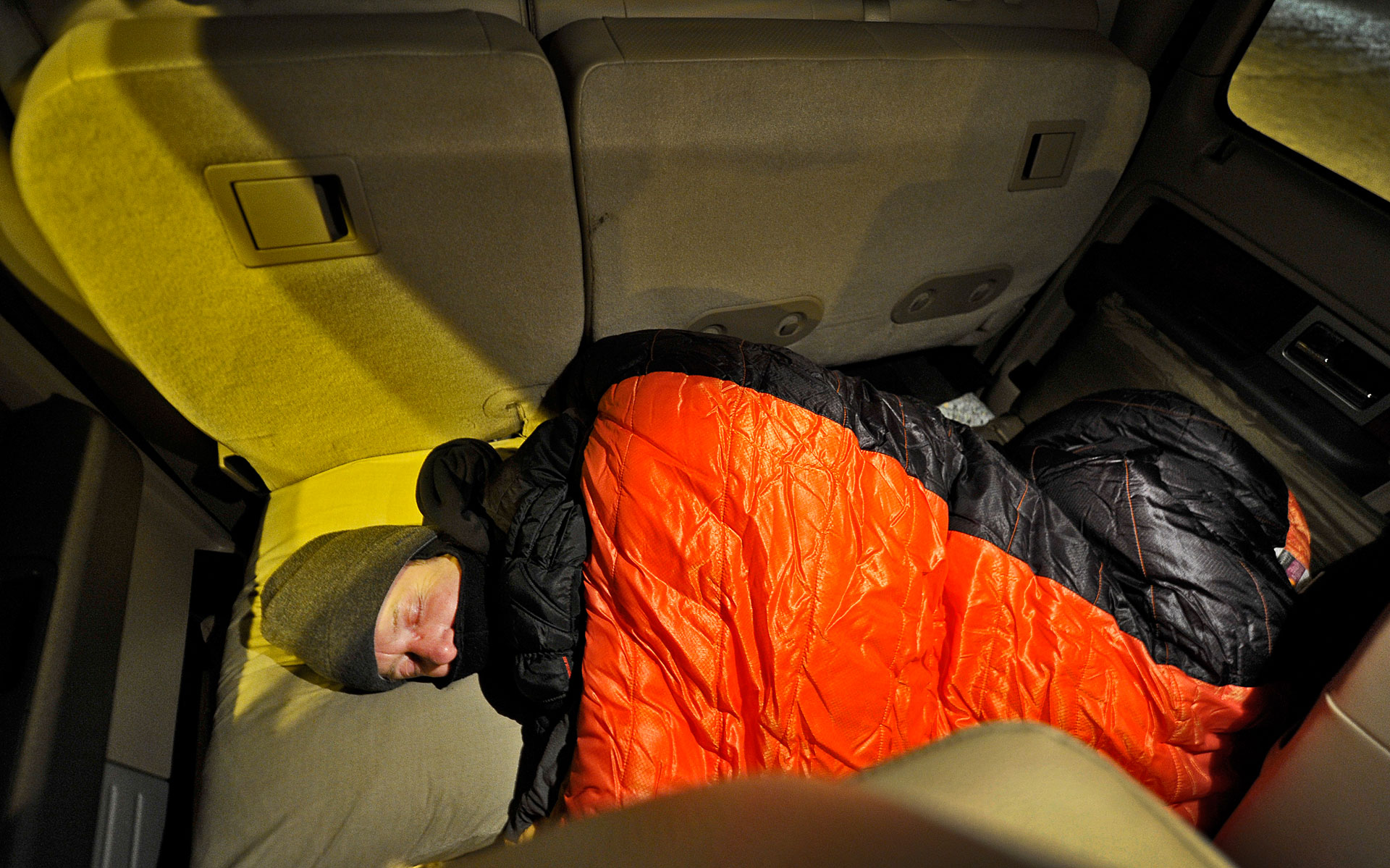
Bob Fisher, who sleeps out once again
To say it's a cold night is an understatement. It's the kind of cold that burns and freezes the inside of your nose. Your lungs feel as though they could crystalize. It's the night of Wednesday, Dec. 11, and the IOCP building in Plymouth is buzzing. The literal overnight sleep out is one of their marquee events of the month-and-a-half long "Sleep Out" fundraising campaign.
This particular event is the one that saw its humble beginnings start in Fisher's front yard, with Fisher shivering away to raise $10,000. This year's goal is more than $2 million. Fisher acknowledges that the event has taken on a life of its own, but is glad that the event is in the hands of IOCP.
"It was good that this happened with Interfaith because other organizations might not have been able to carry it off like that," Fisher said. But, at Interfaith, that's kind of their mission anyway."
Fisher walks around IOCP's consignment shop, ReSale 101, with a smile on his face. He visits with guests, participants and clergy from the area. His wife, Terrisa, joins him, but concedes that she will not be sleeping out. She's participated before, but said she is at her best when supporting Fisher through the cause.
As Terrisa watches Fisher mingle with the crowd, she makes note that the "Sleep Out" is far bigger than she ever could have imagined.
"We were in a service group together when he told people what he did and described the 'Sleep Out.' It really didn't click then. It wasn't until I came to the community when I saw what people were doing that I saw the impact," Terrisa Fisher said. "He was very humble when he told our group that he started this thing called the 'Sleep Out.' It really didn't dawn on me until we were engaged, came to Wayzata and saw that three-quarters of the community had a part in this."
As a night of conversing winds down, Fisher looks outside and then heads to where he stored his overnight clothes. He has layers on top of layers to stay warm. Fisher's cumbersome boots crunch in the snow as he walks toward his truck, his resting place for the night.
Around a dozen participants take part in sleeping outside in the frigid weather. Organizers fear the cold kept others from sleeping out.
Fisher falls asleep in his truck with flurries falling outside. In the morning, Fisher emerges with sleep still clouding his mind. He first makes note that the cold air has done a number on his throat, a factor he forgot to take into account. His voice is slightly raspy from the dryness.
"My only goal was just to raise awareness and to get people involved. So many people are aware and so many people are involved," Fisher said. "I just really believe that these random acts of kindness have such an affect on people."

